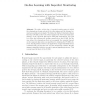147 search results - page 17 / 30 » Learning of Resource Allocation Strategies for Game Playing |
ATAL
2011
Springer
12 years 7 months ago
2011
Springer
We develop an algorithm for opponent modeling in large extensive-form games of imperfect information. It works by observing the opponent’s action frequencies and building an opp...
COLT
2003
Springer
14 years 1 months ago
2003
Springer
We study on-line play of repeated matrix games in which the observations of past actions of the other player and the obtained reward are partial and stochastic. We define the Part...
UAI
2008
13 years 9 months ago
2008
In addressing the challenge of exponential scaling with the number of agents we adopt a cluster-based representation to approximately solve asymmetric games of very many players. ...
DIGRA
2005
Springer
14 years 1 months ago
2005
Springer
Young people’s participation in online digital culture is one of the most efficient means by which they become proficient in the management of Information and Communications Tec...
GECCO
2009
Springer
14 years 11 days ago
2009
Springer
We apply CMA-ES, an evolution strategy with covariance matrix adaptation, and TDL (Temporal Difference Learning) to reinforcement learning tasks. In both cases these algorithms se...

